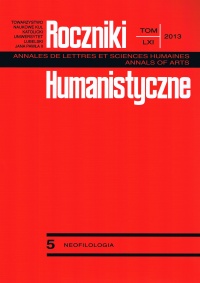Principles of Equivalent Selection in English Prose Translations of Jerome’s Psalters: A Study Based on exaudire and videre
Abstrakt
Zasady wyboru ekwiwalentów w angielskich prozaicznych łumaczeniach Psałterzy św. Hieronima. Studium na podstawie czasowników exaudire i videre
W artykule analizowane są odpowiedniki łacińskich czasowników exaudire i videre w angielskich tłumaczeniach Psałterzy św. Hieronima dokonanych pomiędzy okresem staroangielskim a wczesnonowoangielskim w celu ustalenia zasad rządzących wyborami ekwiwalentów w analizowanych tekstach. W badaniach ustalono, że oba łacińskie czasowniki były tłumaczone na język angielski (w przeważającej większości przypadków) za pomocą czasowników prototypowych, z tym, że pod wpływem zmian zachodzących w języku prototypy te ulegają zmianom. W języku staroangielskim status prototypów miały czasowniki prefiksalne ge-hȳran i ge-sēon, podczas gdy poczynając od okresu średnioangielskiego, były to ich nieprefiksalne odpowiedniki: hēren > hear i sēn > see. Następnie stwierdzono, że o ile odpowiedniki czasownika exaudire były we wszystkich testach i we wszystkich kontekstach takie same, to odpowiedniki videre wykazywały zróżnicowanie, ale dotyczyło to wyłącznie tłumaczenia staroangielskiego. Różnice te wynikają z dwóch czynników. Pierwszy z nich jest ulokowany wewnątrz języka i wynika z uniwersalnego dla czasownika widzieć rozwoju znaczeń metaforycznych, które występują również w badanym tekście. Drugi jest pozajęzykowy i związany jest ze średniowieczną konwencją tłumaczeń tekstów biblijnych: jedynym tekstem, który tej konwencji się opiera i w którym te metaforyczne znaczenia tłumaczone są kontekstowo, tj. za pomocą różnych czasowników, jest staroangielski Psałterz Paryski. Wszystkie pozostałe teksty cechuje stały wybór ekwiwalentów, przez co wpisują się one w średniowieczną konwencję tłumaczeń sakralnych, które charakteryzuje niezwykła bliskość tekstowi oryginalnemu.
Bibliografia
Bosworth, Joseph and Thomas Northcote Toller. (1898). An Anglo-Saxon Dictionary Based on the Manuscript Collections of the Late Joseph Bosworth, Edited and Enlarged by T. Northcote Toller. London: Clarendon Press.
Bramley, Henry Ramsden (ed.). (1884). The Psalter, or Psalms of David and Certain Canticles with a Translation and Exposition in English by Richard Rolle of Hampole. Edited from Manuscripts. Oxford: Clarendon Press. [online] http://quod.lib.umich.edu/cgi/t/text/text-idx?c=cme;cc=cme;view=toc;idno=AJF7399.0001.001
Bright, James Wilson and Robert Lee Ramsay (eds.). (1907). Liber Psalmorum: the West-Saxon Psalms Being the Prose Portion, or the ‘First Fifty,’ of the So-Called Paris Psalter. Edited from the Manuscript, with an Introduction and an Appendix. Boston, MA and London: D.C. Heath and Co.
Brown, George Hardin. (1999). The psalms as the foundation of Anglo-Saxon learning. In Nancy Elizabeth van Deusen (ed.). The Place of the Psalms in the Intellectual Culture in the Middle Ages. Albany, NY: State University of New York Press. 1-24.
Bülbring, Karl Daniel. (ed.). (1891). The Earliest Complete English Prose Psalter together with Eleven Canticles and a Translation of the Athanasian Creed. Edited from the Only Two MSS. in the Libraries of the British Museum and of the Trinity College, Dublin with Preface, Introduction, Notes and Glossary. London: Kegan Paul, Trench, Trubner and Co. [online] http://quod.lib.umich.edu/cgi/t/text/textidx?c=cme;cc=cme;view=toc;idno=BAA8159.0001.001
Charzyńska-Wójcik, Magdalena. (2013). Text and Context in Jerome’s Psalter. Prose Translations into Old, Middle and Early Modern English. Lublin: Wydawnictwo KUL.
Corpus of Middle English Prose and Verse. Ann Arbor, MI: University of Michigan Library. [online] http://quod.lib.umich.edu/c/cme/
Cunyus, John G. (2009). The Audacity of Prayer: A Fresh Translation of the Book of Psalms (Latin-English Edition). Glen Rose, TX: Searchlight Press.
Douay Bible = (1609-10). The Holie Bible Faithfvlly Translated into English, ovt of the Avthentical Latin Diligently Conferred with the Hebrew, Greeke, and Other Editions in Diuers Languages: with Argvments of the Bookes, and Chapters: Annotations: Tables: and Other Helpes, for Better Vnderstanding of the Text: for Discouerie of Corrvptions in Some Late Translations and for Clearing Controversies in Religion. Volume II. Doway: Lavrence Kellam. [online] http://archive.org/details/holiebiblefaithf02engl
Forshall, Josiah and Frederic Madden. (eds.). (1850). The Holy Bible, Containing the Old and New Testaments, with the Apocryphal Books, in the Earliest English Versions Made from the Latin Vulgate by John Wycliffe and His Followers. Oxford: University Press. [online] http://quod.lib.umich.edu/cgi/t/text/textidx?c=cme;cc=cme;view=toc;idno=AFZ9170.0001.001
Hargreaves, Henry. (1965). From Bede to Wyclif: medieval English Bible translations. Bulletin of the John Rylands Library 48: 118-140.
Harris, Stephen J. (2012). Happiness and the psalms. In Michael Fox and Manish Sharma (eds.). Old English Literature and the Old Testament. Toronto, ON: University of Toronto Press. 292-314.
Kastovsky, Dieter. (1992). Semantics and vocabulary. In Richard Milne Hogg (ed.). The Cambridge History of the English Language. Volume I: The Beginnings to 1066. Cambridge: Cambridge University Press. 290-408.
Paris Psalter = MS Bibliothèque Nationale Fonds Latin 8824. [online] http:// gallica.bnf.fr/ark:/ 12148/btv1b8451636f/f1.image.r=psalterium%20duplex.langEN
Schwartz, Werner. (1955). Principles and Problems of Biblical Translation: Some Reformation Controversies and Their Background. Cambridge: Cambridge University Press.
Toronto Corpus = Cameron, Angus and Roberta Frank. (eds.). Complete Corpus of Old English: the Toronto Dictionary of Old English Corpus. University of Toronto Centre for Medieval Studies. The Oxford Text Archive. [online] http://ota.ahds.ac.uk/
Copyright (c) 2013 Roczniki Humanistyczne

Utwór dostępny jest na licencji Creative Commons Uznanie autorstwa – Użycie niekomercyjne – Bez utworów zależnych 4.0 Międzynarodowe.





